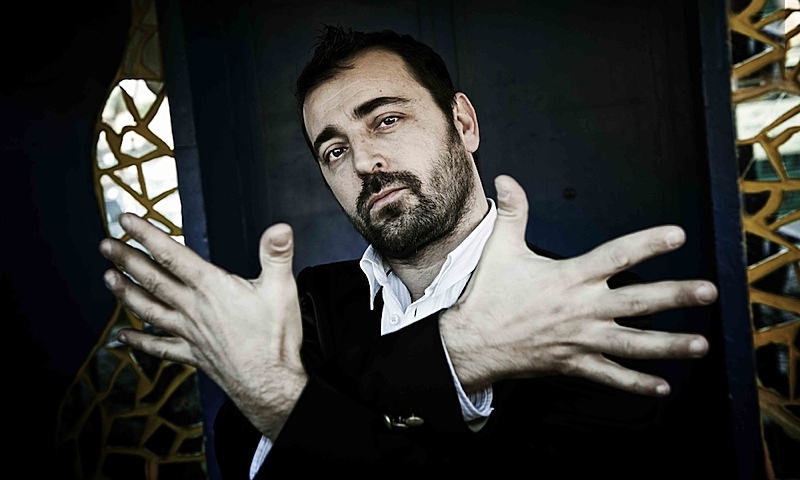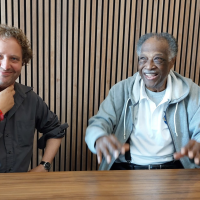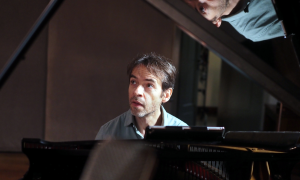Home » Jazz Articles » Interview » The Passion of Lorenzo Tucci
The Passion of Lorenzo Tucci

Jazz musicians should keep pace with the times and witness what surrounds them, being influenced by the places that change, by the people, by modernity.
—Lorenzo Tucci
All About Jazz: Lorenzo, you have been professionally active in music for more than twenty years. When and how did your interest in music start?
Lorenzo Tucci: Since a very young age I have generally loved music. I liked everything that was music, of all kinds and from a very young age I sang a lot, I also won in a local contest.
AAJ: What made you choose the drums?
LT: Before playing the drums I also approached the piano and guitar, and then around the age of twelve I began to play the drums and I haven't left them since. I feel assured when I am able to study and put into practice the things I have in mind, it's not a matter of practice or technique, but a mental thing. You have assurance once you dominate the instrument and therefore the music itself.
AAJ: How did you discover jazz music?
LT: I believe that I was illuminated one night whilst listening to the radio, that was transmitting John Coltrane who was playing Giant Steps (Atlantic, 1959), and I said to myself: "this is my music." I was very young. I come from a very beautiful town called Atessa, in Abruzzo. In the 1980s it was not very easy to buy records there. You had to have great passion in jazz music to discover the latest new releases. However, I found the expressive power of John Coltrane absolutely fascinating. I developed an interest in this great artist and began to do research on him.. Many successful drummers played with him and made history in jazz music. As a drummer myself I couldn't do more than listen and learn. This is how you learn jazz, by doing a lot of listening.
AAJ: And you went on listening and started playing this jazz music...
LT: My experience has been a kind of evolution that occurred in a small period of time. As a child I was very attracted to music with musicians as soloists. I think from then on I'm attracted by jazz music, although I wasn't fully aware at that point. Only later on I understood that music with solo musicians is called jazz and then I realised I am a jazz musician. Profession and career come naturally if you have the passion and the desire to study. Jazz music is more than a musical genre but the desire to go beyond the rules, breaking them, taking them to an extreme according to your taste and creativity.
AAJ: Do you regard yourself as part of a common jazz tradition?
LT: I try to play who I am, in the period in which I live, so therefore I feel I am a witness of the period in which I live, of course. I have listened to so much of what great musicians have done before me and as a result I've learnt a lot from them. I do not feel like a musician who plays at a specific way, I do not feel like a "traditional" musician. I believe that this is my way to play and you can hear that on my records. Jazz is an art that changes with time and jazz musicians should keep pace with the times and witness what surrounds them, being influenced by the places that change, by the people, by modernity.
AAJ: How do you think jazz music will develop?
LT: I'm always very skeptical of those who say that great jazz that was made in the past can never be made again. The new styles of Coltrane, Miles Davis and McCoy Tyner, exist and will continue to be. Presently, there are incredible musicians that play amazingly with an exceptional talent. Jazz is taught everywhere and I notice that there is much interest in this kind of music. Therefore, jazz develops day by day relentlessly. Everything goes on.
AAJ: Let's go back to the start of your career. Your cooperation with Rosario Giuliani dates back to 1995. Please, tell me more about your musical relationship with Giuliani.
LT: Rosario and I know each other since we started collaborating in 1995. We have done many things together, many concerts and four albums. Rosario has great musical talent and many great qualities as a leader. He is able to obtain the most from musicians that are around him. He is also a very stubborn and tenacious person, and this is what I learned from him, that talent isn't enough, but you also need great will and tenacity in order to get good results.
AAJ: How did you meet him?
LT: Rosario and I met in the world of music in 1995, but we knew each other before. There was a small club in Rome, which now no longer exists, called Stardust where we played a lot, did some wonderful jam sessions as well as many encounters amongst musicians. Here, Rosario and I decided to create a quartet band which later turned out to be famous and lucky. Besides myself were Pietro Lussu at the piano and Joseph Lepore on bass and then later came Pietro Ciancaglini. With that quartet band, we played a lot in Italy and throughout Europe where I have wonderful memories that I will never forget.
AAJ: Another longtime companion of yours is trumpeter Fabrizio Bosso. How would you describe your musical collaboration with Bosso?
LT: Fabrizio is a very dear friend as well as an incredible musician. With him I've done some very important things playing all over the world, and together we have achieved dozens of albums and also formed the successful band High Five Quintet, whereby I arranged and produced the first record with the singer Mario Biondi A Handful of Soul(Schema, 2006) with 400,000 copies sold.
AAJ: 400,000 copies, that's a lot for a jazz record.
LT: With HFQ what happened is what rarely happens when putting together five musicians and therefore a perfect understanding, affinity and empathy. We have created a unique sound style post Hard-Bop. Within the group were incredibly talented musicians such as Bosso, Daniele Scannapieco, Julian Oliver Mazzariello, Pietro Ciancaglini, and later joined Luca Mannutza and Tommaso Scannapieco, equally talented musicians. We have done important tours and records relevant to the Via Veneto jazz and then for the legendary Blue Note. We also have a beautiful live album recorded at the Blue Note in Tokyo.
AAJ: You was also co-founder of the LTC Trio, together with pianist Pietro Lussu and Ciancaglini. As far as I know you recorded 2 records, what happened to the trio?
LT: Nothing serious has happened to the trio. With Lussu and Ciancaglini we were the rhythm of many groups with a great interplay, also because we had in common a strong background, so we decided to make records in a trio seeing that this obtained excellent results. Then, as often happens, between the various commitments many projects are weakened. I do expect another return.
AAJ: Ciancaglini is also a member of your own trio. On your album Drumonk (Veneto Jazz, 2007) you, Bosso and Ciancaglini reproduce Monks' complex sound without using a piano. How did you do that?
LT: Monk has always stimulated my imagination with his compositions, both from the point of view of harmony and above all rhythm. The compositions that I chose for Drumonk were chosen respecting the characteristics of the trio, namely the characteristics of the musicians making them better express themselves in the best way possible, which critics appreciated very much and this was very rewarding for me.
AAJ: Three years later you recorded Tranety (Albore Jazz, 2010), a tribute to John Coltrane. It is a piano-trio album. Why didn't you include a saxophonist in this band?
LT: John Coltrane was an extraordinary saxophonist and a person with incredible and deep humanity. His compositions reflect his character and have always attracted me, the sweetness in his pathos are elements that I do regardless of the instrument that he played, and it is for this reason that I didn't use the saxophone in Tranety. Beautiful music is independent from the instrument one plays. With the piano trio I tried to mellow even more the thematical parts and with the touch of elegance from Filippini I got what I wanted. I would also like to emphasize the extraordinary support from Luca Bulgarelli, with whom I have played for many years.
AAJ: So you were inspired by Coltrane and by Thelonious Monk, as evidenced by one of your albums. Which contemporary musicians are you inspired by today?
LT: I am inspired by everything I listen to whilst touring the world and I don't really have any real idols. I find inspiration in everything and everyone who is serious when it comes to playing and writing. I am very attentive to what is happening in U.S.A. I find that they are the ones who dictate the rules when it comes to jazz. I listen to contemporary musicians like Robert Glasper and the lyricism of Brad Mehldau, Mark Turner, Chris Potter, David Binney, and Brian Blade who are musicians that I respect very much and always transmit something to me every time I listen to them.
AAJ: What about your Italian colleagues?
LT: Although Italy is full of young talented people, they deserve more visibility outside of the country but it is only a matter of management and marketing. It is in these things that Italy is still behind. But I must say that there is much talent over here.
AAJ: Could you name a few?
LT: I'll mention a few people that are very young, such as Claudio Filippini a pianist that I wanted to be part of my trio band, whom I believe has a beautiful touch, sensitivity and preparation. Another pianist who is worth noting is Enrico Zanisi. Also drummer Enrico Morello, bassist Luca Alemanno and I should not forget to mention Francesco Cafiso who is also quite popular. These musicians are all younger than thirty years. In addition there are so many older musicians. But this is a rather long list and I wouldn't want to make the mistake of forgetting someone.
AAJ: Do you think we can speak of an Italian jazz school?
LT: I do not believe in an Italian jazz school, as demonstrated by the fact that everyone listens and is influenced by what happens abroad. I rather believe in a more melodically Italian style that is certainly very strong, but at this point we could talk not only about jazz, but of many Italian artists in all genres of music.
AAJ: Your album Touch (Schema, 2009) is a mix of different styles, ranging from jazz to Latin and Bossa nova. What inspired you to this album?
LT: Initially I was inspired by the legendary orchestra of Kenny Clarke, Francy Boland and their compositions, then as I worked the direction changed and in the end I put on the album also other things. I wanted to make a more attractive record from the point of view of its usability and its groove. I wanted to reach a wider audience and so it was. I also added "The Sky" which is a purely dance song, someone judged this choice as a provocation, and was right!
AAJ: Please tell me more about your recently released album Drumpet (Jando Music/ via Veneto Jazz, 2014), how did it come about?
LT: As you may have realized always the record is entirely performed in duo with drums and trumpet where there are several different moods and sounds ranging from free to more catchy themes written for this project. Before starting in the studio, I thought above all about the sound that I wanted to obtain for this record. I used a large drum set with a strong tune, with very sharp sounds, very tribal and to make this album I chose the most important recording studio that Rome has. The sound for this album has been considered a wide range of detail.
AAJ: How did you experience working with Bosso again?
LT: Making this album was very stimulating from the point of view of creativity, but also a quite difficult task which can only be accomplished with a partner like Bosso. He puts on show all that a trumpet can do, also making use of electronics, which in my opinion is used in a very smart way and as always is rather masterful. Fabrizio and I have done a lot together and the understanding that we have amongst each other is almost telepathic.
AAJ: What can we expect further from you this year?
LT: I will continue to perform with the Tranety trio, together with Filippini and Bulgarelli, and together with Luke Mannutza in the LUNAR duo. Obviously, I will continue collaborating with Fabrizio Bosso in the Drumpet duo. There will certainly be other collaborations with other sidemen. I see 2014 as very eventful, and meanwhile I'm starting to think about a new album.
AAJ How do you look back at your career right now?
LT: I'm satisfied! In time, I have met many wonderful people, and I've collaborated with talented and respected musicians, I have traveled the world. I consider myself a lucky person, and my enthusiasm and love for music has pushed me to do better. I hope to succeed.
Tags
Lorenzo Tucci
Interview
Robin Arends
United States
Thelonious Monk
John Coltrane
Phil Woods
George Cables
Enrico Pieranunzi
Nicola Conte
Fabrizio Bosso
Miles Davis
McCoy Tyner
Rosario Giuliani
Joseph Lepore
Julian Mazzariello
Luca Mannutza
Luca Bulgarelli
Robert Glasper
brad mehldau
Mark Turner
Chris Potter
David Binney
Brian Blade
Claudio Filippini
Enrico Zanisi
Francesco Cafiso
Kenny Clarke
Francy Boland
PREVIOUS / NEXT
Support All About Jazz
 All About Jazz has been a pillar of jazz since 1995, championing it as an art form and, more importantly, supporting the musicians who make it. Our enduring commitment has made "AAJ" one of the most culturally important websites of its kind, read by hundreds of thousands of fans, musicians and industry figures every month.
All About Jazz has been a pillar of jazz since 1995, championing it as an art form and, more importantly, supporting the musicians who make it. Our enduring commitment has made "AAJ" one of the most culturally important websites of its kind, read by hundreds of thousands of fans, musicians and industry figures every month.






















